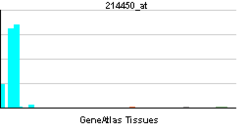Cathepsin W
Cathepsin W is a protein that in humans is encoded by the CTSW gene.[3][4][5]
The protein encoded by this gene, a member of the peptidase C1 family, is a cysteine proteinase that may have a specific function in the mechanism or regulation of T-cell cytolytic activity. The encoded protein is found associated with the membrane inside the endoplasmic reticulum of natural killer and cytotoxic T-cells. Expression of this gene is up-regulated by interleukin-2.[5]
References
- ↑ "Human PubMed Reference:".
- ↑ "Mouse PubMed Reference:".
- ↑ Linnevers C, Smeekens SP, Bromme D (May 1997). "Human cathepsin W, a putative cysteine protease predominantly expressed in CD8+ T-lymphocytes". FEBS Lett. 405 (3): 253–9. doi:10.1016/S0014-5793(97)00118-X. PMID 9108299.
- ↑ Wex T, Levy B, Smeekens SP, Ansorge S, Desnick RJ, Bromme D (Aug 1998). "Genomic structure, chromosomal localization, and expression of human cathepsin W". Biochem Biophys Res Commun. 248 (2): 255–61. doi:10.1006/bbrc.1998.8954. PMID 9675123.
- 1 2 "Entrez Gene: CTSW cathepsin W".
Further reading
- Gerhard DS, Wagner L, Feingold EA, et al. (2004). "The status, quality, and expansion of the NIH full-length cDNA project: the Mammalian Gene Collection (MGC).". Genome Res. 14 (10B): 2121–7. doi:10.1101/gr.2596504. PMC 528928
 . PMID 15489334.
. PMID 15489334.
- Meinhardt C, Peitz U, Treiber G, et al. (2004). "Identification of a novel isoform predominantly expressed in gastric tissue and a triple-base pair polymorphism of the cathepsin W gene.". Biochem. Biophys. Res. Commun. 321 (4): 975–80. doi:10.1016/j.bbrc.2004.07.056. PMID 15358123.
- Zhang Z, Henzel WJ (2005). "Signal peptide prediction based on analysis of experimentally verified cleavage sites.". Protein Sci. 13 (10): 2819–24. doi:10.1110/ps.04682504. PMC 2286551
 . PMID 15340161.
. PMID 15340161.
- Strausberg RL, Feingold EA, Grouse LH, et al. (2003). "Generation and initial analysis of more than 15,000 full-length human and mouse cDNA sequences.". Proc. Natl. Acad. Sci. U.S.A. 99 (26): 16899–903. doi:10.1073/pnas.242603899. PMC 139241
 . PMID 12477932.
. PMID 12477932.
- Buhling F, Kellner U, Guenther D, et al. (2003). "Characterization of novel anti-cathepsin W antibodies and cellular distribution of cathepsin W in the gastrointestinal tract.". Biol. Chem. 383 (7-8): 1285–9. doi:10.1515/BC.2002.144. PMID 12437118.
- Wex T, Bühling F, Wex H, et al. (2001). "Human cathepsin W, a cysteine protease predominantly expressed in NK cells, is mainly localized in the endoplasmic reticulum.". J. Immunol. 167 (4): 2172–8. doi:10.4049/jimmunol.167.4.2172. PMID 11490002.
- Wex T, Levy B, Wex H, Brömme D (2000). "Human cathepsins W and F form a new subgroup of cathepsins that is evolutionary separated from the cathepsin B- and L-like cysteine proteases.". Adv. Exp. Med. Biol. 477: 271–80. doi:10.1007/0-306-46826-3_29. PMID 10849754.
- Brinkworth RI, Tort JF, Brindley PJ, Dalton JP (2000). "Phylogenetic relationships and theoretical model of human cathepsin W (lymphopain), a cysteine proteinase from cytotoxic T lymphocytes.". Int. J. Biochem. Cell Biol. 32 (3): 373–84. doi:10.1016/S1357-2725(99)00129-6. PMID 10716634.
- Wex T, Levy B, Wex H, Brömme D (1999). "Human cathepsins F and W: A new subgroup of cathepsins.". Biochem. Biophys. Res. Commun. 259 (2): 401–7. doi:10.1006/bbrc.1999.0700. PMID 10362521.
- Brown J, Matutes E, Singleton A, et al. (1998). "Lymphopain, a cytotoxic T and natural killer cell-associated cysteine proteinase.". Leukemia. 12 (11): 1771–81. doi:10.1038/sj.leu.2401164. PMID 9823953.
External links
- The MEROPS online database for peptidases and their inhibitors: C01.037
|
|---|
|
| Activity | |
|---|
|
| Regulation | |
|---|
|
| Classification | |
|---|
|
| Types | |
|---|

 . PMID 15489334.
. PMID 15489334. . PMID 15340161.
. PMID 15340161. . PMID 12477932.
. PMID 12477932.